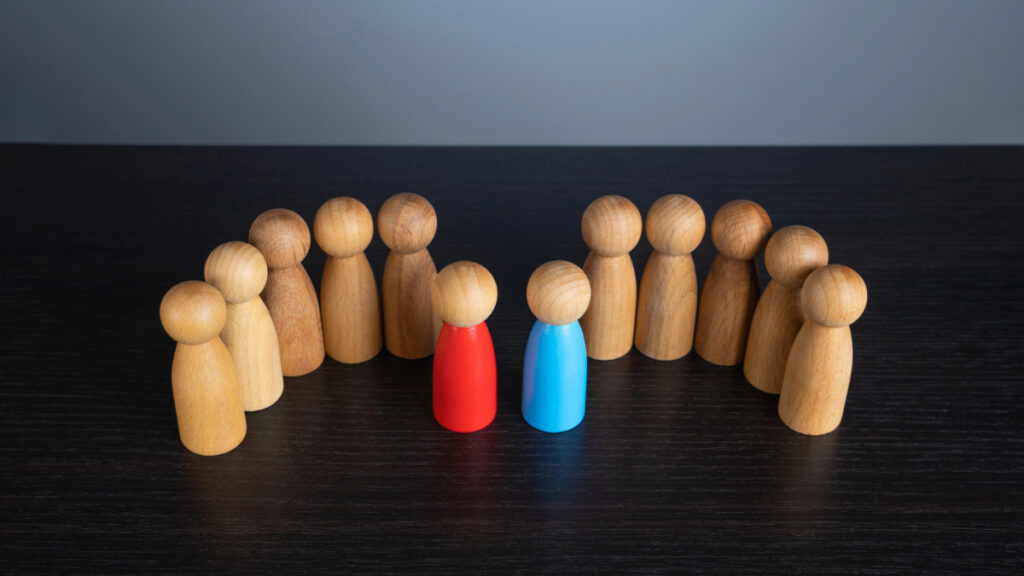Today, the 3rd Thursday in October, is Conflict Resolution Day. This yearly observance exists to highlight conflict resolution and raise awareness about the importance of creative, respectful, and peaceful ways to navigate and resolve conflict and to promote the use of these methods across society.
As a conflict resolution expert, former mediator, and now trainer and speaker on this topic, it’s an important observance for us at Hammond International Inc.
Conflict Resolution Day: Developing Essential Everyday Skills
Difficult conversations and conflict occur in all areas of life, including personal relationships, family, work, and business. Whether it’s providing feedback to someone, sharing bad news, voicing a perspective or idea that may not align, misunderstandings, or disagreeing, these conversations can cause us to feel discomfort, angst, and worry. Conflict (and the dread of dealing with it) can take over our thoughts and lead to increased stress, as well as trust and relationship breakdowns.
It’s important to build conflict resolution skills so you can handle tough conversations, communicate clearly, and support a healthy, safe working environment. Furthermore, these skills work well in our personal relationships too.
Conflict is most effectively resolved through safe, open, and honest conversations. But what if you’re worried about making the situation worse? Perhaps you’re worried about how the other person will react to you. You might find yourself hoping that the whole thing will just go away or work itself out.
4 Ways You Can Navigate Conflict

1: Do a mindset check-in.
How you think about conflict, the other person, and the upcoming conversation shapes how you show up in the conversation. Your mindset influences the words you use, how you communicate, your tone of voice, and the extent to which you welcome and invite perspectives that differ from your own.
How you show up impacts your results and resolutions in conflict situations. Instead of thinking of the conversation as something you desperately want to avoid (a conversation that you are “dreading” or anticipate will be awful), reframe it to “this is a conversation where we can both share our perspectives to solve this issue together.”
2: Bookend your conversations.
Bookends on a bookshelf keep books from falling over, and they play a similar role in conversations. The first and last 90 seconds of a discussion shape what happens in the middle and what happens after the conversation is done. The beginning sets the tone, and the ending influences how people feel when they leave and when they see you again. Try practicing how you start and end a conversation.
3. Build bridges to help foster connection and understanding.
Bridges are important in conversations. In real life, they help you cross rough water and bumpy terrain. In communication, bridges help you get across the challenging parts of the dialogue.
In conflict, a bridge is about making a connection between a person’s point and your perspective. It’s about connection and understanding, about finding a way together over and through the difficult “stuff.” Bridges connect people. When people feel connected, understanding begins to take place. People learn about how the other sees the situation, what matters to them, and often, common ground is created.
4. Replace the word “But” with “And.”
The word “but” is a simple and short word, but those three letters can change the tone of the conversation and leave an impact, often not in the way we want. The term “but” minimizes what the person said and can leave the individual feeling unheard, minimized, and not valued.
Imagine someone saying to you, “That’s an incredible idea, but what I was thinking would work better is…” That may make you feel like the person meant, “That is a great idea, but mine is a better idea!”
Use the words “yes and” as an alternative to the word “but.” Here’s what this looks like: “Yes. That’s a great idea, and I thought that another option we could also consider is …”
Putting Conflict Resolution into Practice
These skills can help you reframe and turn different conversations and confrontations into curious conversations and respectful dialogues.
On this Conflict Resolution Day, take a moment to reach out to someone you know who works in the field, or to simply acknowledge the skills and mindsets you bring to tough conversations and that foster safety, respect and resolution.

